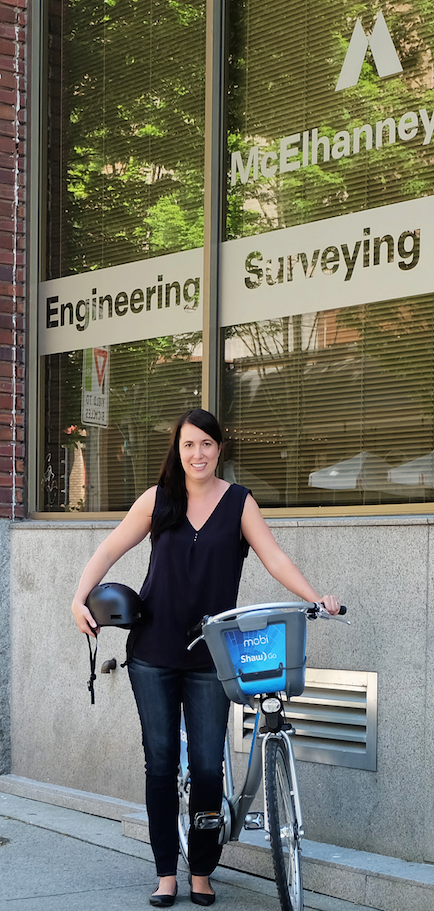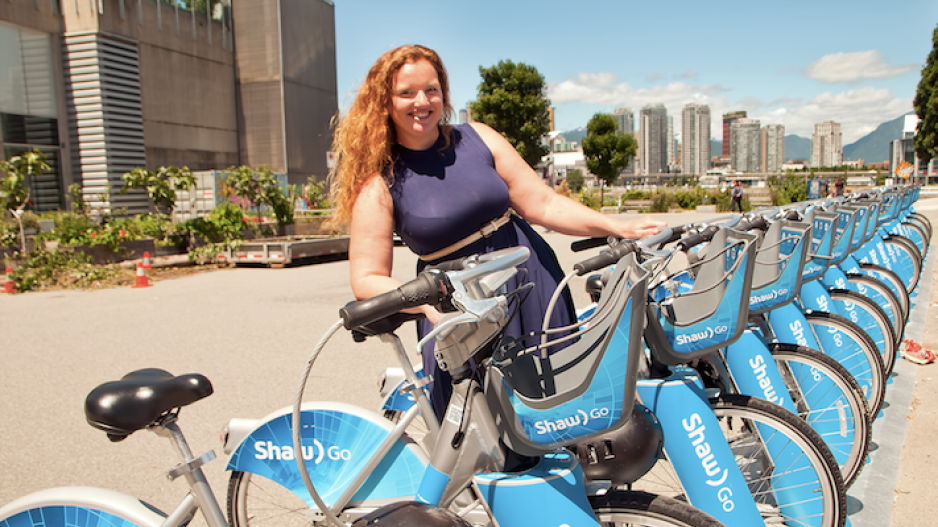The Mobi bike-share program has had a slower-than-expected rollout, but organizers and the City of Vancouver say the program’s first year has been a success and that membership growth is accelerating, in part because the company has started to offer corporate memberships.
The 1,200-bike system has consistently broken one-day ridership records in the lead-up to its one-year anniversary on July 20. The 3,900 trips made on July 1 was the most ever, as of press time.
Summer weather, new stations and more bikes are helping fuel that ridership. So are corporate memberships.
Mobi has started partnering with businesses to provide incentives to their employees to buy Mobi memberships.
Mobi gives its 19 corporate members’ employees about 25% off the price for two different classes of annual membership. The corporate members then often provide a further 25% discount.
“It’s an employee perk as part of our health and wellness initiative,” said Joy Leimanis, a project manager at the engineering consulting company McElhanney. “It’s also part of our community involvement, as we like to support local initiatives.”
Eight McElhanney employees have taken the company up on the offer, and Leimanis expects many more to join the program in the lead-up to July 31, when the inaugural, discounted annual memberships, which Mobi offered as a promotion last year, expire.
“A bike-share program takes about a year to implement,” general manager Mia Kohout told Business in Vancouver. “The advantage rolling it out over time is that we can see where the usage is, where the gaps are and where patterns of commuting are.”
Mobi originally promised to have 150 stations by the end of last summer, but it has built only 122.
The system has largely kept to its original boundaries of Burrard Inlet, Main Street, 16th Avenue and Arbutus Street. Some stations are within a few blocks west of Arbutus while a handful of others are a few blocks east of Main Street.

Further expansion east and west (but not south) is likely next year, Kohout said.
Some bike-rental store owners are complaining about the system’s operations in Stanley Park, where five of seven approved stations have been installed.
(Image: McElhanney project manager Joy Leimanis helped launch a corporate partnership with Mobi for her engineering consulting company's staff | submitted)
“Mobi has definitely taken away some business,” said English Bay Bike Rentals owner Joe Kainer. However, “it has not been disastrous as there are still a lot of people coming in.”
He said that if Mobi’s goal is to appeal to commuters, park locations are unnecessary.
Kohout declined to reveal Mobi’s financial information but said the venture has about 6,300 members, including about 4,300 who purchased annual memberships.
The system owes its existence to the City of Vancouver.
The city pumped $5 million into capital costs to get the bike-share program started. It also contributed $1 million for various other startup costs and agreed to provide an additional $500,000 per year for each of the first five years.
The city has since created a five-person bike-share branch that co-ordinates with Mobi around where to locate stations, that branch’s manager, Scott Edwards, told BIV.
Edwards expects the 25-employee Mobi to pay the city $400,000 later this year to compensate the city for lost parking revenue – the maximum amount under the agreement, even though the city’s original expectation was that it would lose far more than that in parking revenue.
Shaw Communications Inc. became a Mobi sponsor in December, when it agreed to contribute an undisclosed amount to the bike-share company in exchange for prominent Shaw branding on Mobi bicycles.
Shaw executive vice-president Jim Little promised at the time that Shaw would provide Wi-Fi hot spots for members at Mobi stations, although that initiative has not yet been carried out.
Shaw’s sponsorship with Mobi stipulates that no other company can put branding on the bikes or helmets, Kohout said.
Additional revenue has come from bumping up prices and eliminating the monthly membership option.
Those who bought annual memberships as part of the system’s inaugural promotion will be able to renew that membership for $99 as long as they do not let their memberships lapse. All new annual members will be charged at least $129.•




